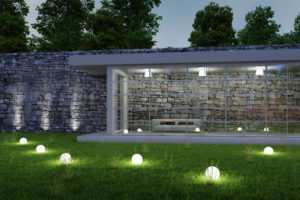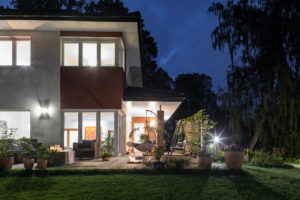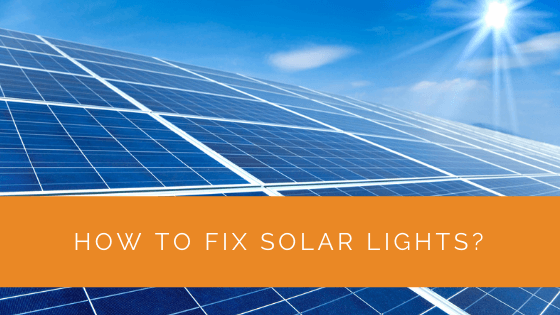Solar lights can be a fantastic addition to any household, as they are convenient means of generating electricity from solar energy. They are smoke-free, cut down your electric bills, and keep the surroundings clean. However, they’re gadgets and may stop working at some point.
A faulty battery or a broken sensor may be causing the issue. Whatever it is, proper maintenance and replacing the worn-out parts will get your solar lights back on track.
Curious to know all about it? This post will break down all the steps to fix your solar lights and prevent them from malfunctioning again.
Contents
Why Do Solar Lights Stop Working?
Solar lights are usually resilient in structure and weatherproof. However, they always need a reasonable amount of sunlight to function. So, keeping them under a covered area or a shade won’t allow them to absorb sunlight and generate electricity.
Another external factor that messes with many outdoor devices is dirt. This doesn’t spare your solar panels either. If your solar panel accumulates a layer of dust or grime on top, it doesn’t absorb sufficient sunlight to produce electricity.
When this layer of dust gets too thick, it stops the batteries from charging. As a result, the panel won’t work, and you might think the batteries are dead. On the other hand, if a battery is worn out or too old, it might actually stop functioning. It prevents the panel from soaking up the sun efficiently.
No matter what the problem is, you need to fix it quickly to prevent further damage to your solar lights.
Steps To Fix A Solar Light
Now that you have a basic idea of the probable causes of solar light damage, the time has come to fix it for good!
Avoid Shades
As solar lights and their batteries won’t work if put under the shade, place them in an area where they receive direct sunlight. If you have tall grass or bushes surrounding the light, trim them down. Avoid any type of shadows or covers falling on your solar panel.
Doing this will allow the panel to absorb sunlight efficiently and also recharge the batteries. They will light back up! So, always keep an eye out for any shades covering your solar light from time to time.

Replace The Batteries
Usually, solar panels have high-quality batteries, and they recharge themselves under direct sunlight. As they get charged during the day and discharge at night, they might slowly lose their charging capabilities.
So, make sure to replace your batteries after every 2 to 3 years. NiMH or Li-ion batteries can be excellent replacements as they are long-lasting and will serve you for years.
During the replacement, check for any acid leakage caused due to eroded batteries. This leaked acid might have crept into your lights, which can damage them. So, ensure to clean them properly.
Fix That Sensor
A defective sensor may be the root cause of your solar light not working as it used to. As the sensor allows the solar light to react to light and darkness, a faulty sensor doesn’t help.
Therefore, before things get any worse, replace the sensor with the new one. Some manufacturers will offer you replacements, and you’ll be able to fix the sensor yourself. If you can’t, contact the company to repair the sensor. The simple trick can get your solar light working in no time.
Check For Water Build-Up
In general, all solar panels are designed to combat rain or harsh weather conditions. Still, water or moisture may build up inside, damaging the internal circuitry. So, if you find water inside the panel, disassemble it and dry it completely.
After that, put all the parts back together while checking if the batteries are in place. Allow the light to recharge for a day or two, and then turn it on at night to see if it works.
Another thing to check is the sealant, which holds the parts together. If this gets old and worn out, water can seep in and ruin the panel. Thus, if you think this sealant needs replacement, get it done quickly.
Get Rid Of The Dirt
To keep your solar lights working, you need to keep the dust away from them. So, clean any build-up of dirt and dust on your panel’s surface. Even if the layer of dirt is thin, remove it as it hampers the charging and lighting time of the panel over time.
You can use a damp cloth to wipe it down once or twice every week. Using a hose and soapy water is also an effective way to clear off all that grime.

Examine The Plugging
You need to make sure that the solar light’s cable is properly plugged in, especially if the light is separated from the lamp. If there are waterproof connectors, they must also be tightened properly.
Sometimes this simple issue of loose connection or improper plugging might stop the solar light from absorbing sunlight. In case you find it difficult to handle, call an electrician to fix it.
Inspect Sources Of Light Nearby
As the solar panel’s sensors detect any kind of light nearby, it may sense street lights or your neighbor’s apartment lights falling on it. This may interfere with the detection and absorption of sunlight, preventing the solar lights from working properly.
Therefore, you need to examine the lights around your panel carefully. Always try to place the solar light in an area away from artificial light sources to prevent the intervention. However, keep in mind that the light’s surface gets adequate sunlight.
Case Study: Successfully Fixing Solar Lights for a Homeowner
Background
At Solar Panels Network USA, we frequently assist clients in troubleshooting and fixing their solar lights to restore optimal functionality. This case study highlights our approach in resolving issues for a homeowner whose solar lights had stopped working.
Project Overview
A residential client contacted us with concerns about their solar lights, which had ceased to function properly. Our objective was to diagnose the problem and implement effective solutions to get the lights working again.
Implementation
Initial Assessment
We began with a thorough assessment to identify potential issues, considering common problems such as:
- Insufficient sunlight exposure
- Accumulation of dirt and debris on the solar panels
- Worn-out or faulty batteries
- Defective sensors
- Water buildup or moisture damage
Step-by-Step Fixes
- Avoiding Shades: We noticed that some solar lights were placed under the shade of tall bushes. We advised the client to trim the surrounding vegetation and reposition the lights to areas with direct sunlight. This adjustment ensured the solar panels received maximum sunlight for effective charging.
- Replacing the Batteries: Upon inspection, we found that the batteries were old and had lost their charging capability. We recommended replacing them with high-quality NiMH batteries. During the replacement, we checked for acid leakage and cleaned the battery compartment thoroughly before installing the new batteries.
- Fixing the Sensor: We tested the sensors by covering them to simulate nighttime conditions. Several sensors were unresponsive, indicating they were faulty. We replaced these defective sensors, which restored the lights’ ability to turn on automatically at dusk and off at dawn.
- Checking for Water Build-Up: Disassembling the lights, we discovered moisture buildup in some units. We dried the components completely and reassembled the lights, ensuring the batteries were correctly positioned. We also checked and replaced any worn-out sealant to prevent future moisture intrusion.
- Removing Dirt and Debris: The solar panels had accumulated a layer of dust and grime, hindering their efficiency. We cleaned the panels with a damp cloth, enhancing their ability to absorb sunlight. We advised the client to perform this cleaning regularly to maintain optimal performance.
- Inspecting Plugging and Connections: We ensured all cables were properly plugged in and that waterproof connectors were tightly sealed. Loose connections can impede the lights’ ability to charge and operate correctly. Ensuring secure connections resolved this issue.
- Examining Nearby Light Sources: We identified artificial light sources, such as streetlights, that could interfere with the solar panel sensors. Repositioning the lights away from these sources ensured they functioned correctly without external interference.
Results
Following these steps, the client’s solar lights were restored to full functionality. They provided consistent illumination, enhancing the yard’s safety and aesthetic appeal. The client was pleased with the improvements and appreciated the detailed guidance for ongoing maintenance.
Summary
This case study demonstrates the effectiveness of a systematic approach to fixing solar lights. By addressing common issues such as insufficient sunlight exposure, battery replacement, sensor functionality, and cleaning, we successfully restored the client’s solar lights. Regular maintenance and proper placement are key to ensuring the efficiency and longevity of solar lighting solutions. At Solar Panels Network USA, we are committed to helping our clients achieve the best results with their solar lighting through expert advice and support.
Expert Insights From Our Solar Panel Installers About How To Fix Solar Lights
Ensuring your solar lights receive ample direct sunlight is key to their performance. Regularly check for any obstructions or shadows that might affect their efficiency.
Senior Solar Technician
Replacing batteries every 2-3 years can prevent most performance issues with solar lights. Opt for high-quality NiMH or Li-ion batteries for longevity and reliability.
Lead Solar Installer
Cleaning the solar panels regularly to remove dust and grime ensures maximum sunlight absorption, keeping your lights bright and efficient.
Solar Installation Specialist
Our Expertise in Solar Lights
At Solar Panels Network USA, we’re here to provide you with valuable information and support regarding solar lighting. With our experience and understanding of the solar lighting industry, our team of experts is prepared to assist you in finding the right lighting solution for your needs. Whether you’re interested in improving your outdoor spaces, conserving energy, or adopting a more sustainable approach, we’re well-equipped to help. Please feel free to contact us with any questions or inquiries.
Wrap Up
As you probably won’t buy solar lights every year, you need to maintain them properly to get good value for your money. Thus, it’s a good habit to check in on your lights every 2 to 3 days. It will help you keep away dirt, water, or any unwanted vegetation that might affect the solar light’s normal functioning.
Even after going through our tips, if you can’t fix the solar lights, don’t hesitate to contact an expert.
About the Author
Solar Panels Network USA stands at the forefront of solar energy solutions, driven by a team of seasoned solar engineers and energy consultants. With over decades of experience in delivering high-quality solar installations and maintenance, we are committed to promoting sustainable energy through customer-centric, tailored solutions. Our articles reflect this commitment, crafted collaboratively by experts to provide accurate, up-to-date insights into solar technology, ensuring our readers are well-informed and empowered in their solar energy decisions.

